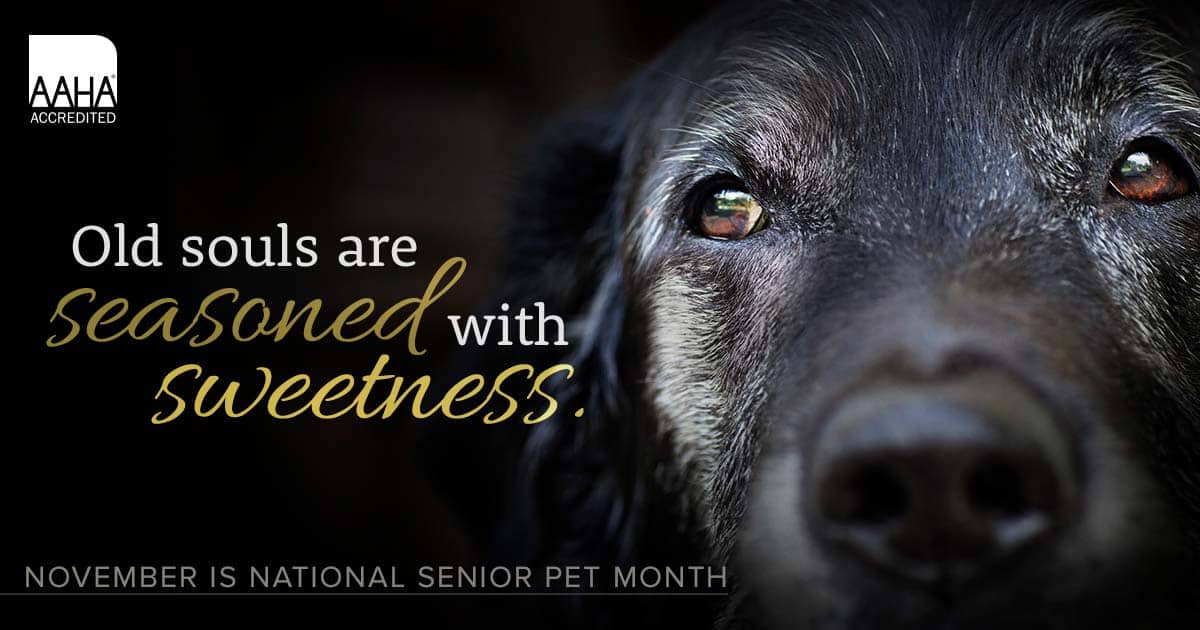One of the most important ways you can keep your senior cat or dog healthy is by being proactive. The following 5 proactive tips will help keep your senior pet as healthy as possible, whether that’s early detection and treatment of a current health issue or preventative steps you can take now to avoid illness in the future.
Proactive Tip #1: Senior Preventive Care Exams
Senior Preventive Care Exams are more in-depth and include expanded blood work panels. The sooner a health issue- such as diabetes and kidney or heart disease among others- can be diagnosed, the sooner proper treatment can begin. Early detection allows you to be proactive rather than reactive, which leads to a better prognosis and also improves your pet’s quality of life.
For these reasons the American Veterinary Medical Association and most veterinarians recommend at least one, and in some cases two preventive care exams a year for senior pets so signs of an illness can be detected and treated early.
If you have a senior pet, schedule an appointment with your veterinarian for a senior pet exam. Then, based on his or her findings, talk to your vet and find out how frequently she or he recommends follow-up exams.
Proactive Tip #2: Good Health Begins With Diet
As pets age, their nutritional needs change based on age, weight, and any medical issues he has been diagnosed with. It’s best to talk to your veterinarian about your senior pet’s nutritional needs and to find out if a change in diet is warranted.
Proactive Tip #3: Appropriate Exercise
The amount and type of exercise you should provide your senior pet is largely dependent on his health status, though environmental factors, such as heat, and breed are important factors. Talk to your veterinarian about a safe and appropriate exercise plan for your senior pet. Your veterinarian can provide expert advice based on your pet’s needs and health status.
Proactive Tip #4: Dental Health
Many owners do not think their pets need dental work; however, just like humans, pets need their teeth cleaned. It is important to note that dental problems do not just appear and then stop, especially when gums are impacted. According to the American Animal Hospital Association (AAHA), dental problems can also lead to other systemic issues and diseases. Make sure dental exams are a part of your senior care routine.
Proactive Tip #5: Parasite Control and Vaccinations
You may be familiar with heartworm and flea prevention medicine, but you will also need to watch for other parasites. Follow your veterinarian’s recommendations for testing and preventing parasitic infections, as these can be devastating to a senior pet. Compromised immune systems can be much deadlier for older pets. However, not all pets will require every vaccination; this depends on the environment and other risk factors. Discuss updating vaccines with your vet, per AAHA recommendations.
Proactive Tip #6: Mental Health
Mental health is easy to overlook, in both people and pets. Keeping your pet mentally stimulated helps preserve their mental health. This should be balanced with routine though, as too much new stimuli can negatively impact your pet’s health.
Caring for senior pets can be challenging, but it is very emotionally rewarding. They give us unconditional love, so we care about ensuring their last years are comfortable. For more information about how to properly care for your senior pet, or to schedule a check-up, contact us today. We will guide you through this time in your pet’s life with caring and compassion, helping you help them enjoy their last years.
